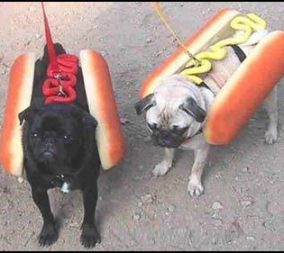Originally published in March of 2012
A common question that arises while pregnant is “What foods should I NOT eat and why?” It doesn’t make intuitive sense that some foods are fine if you are not pregnant, but become a problem once you are. Your immune system changes in pregnancy and some bacteria have an easier time beating your defenses. You need to try to avoid exposure to the bacterium Listeria monocytogenes. The incidence of Listeriosis in pregnancy is 12 per 100,000, compared with a rate of 0.7 per 100,000 in the general population. The CDC monitors cases of Listerial infection. 2009 is the most recent year for which results are available, and 524 cases were reported, with 99 (19%) of them being pregnancy related. Infection can result in miscarriage, premature delivery, stillborn or other serious health problems for the newborn. Listeria is a bacterium that can be found in water, soil and sometimes on plants. Animals and vegetables can then become carriers. Cooking meats, pasteurizing milk and washing vegetables will either kill or remove the bacteria. The problem with food like deli meats is that the food is not eaten immediately after the cooking process. It is refrigerated or smoked, and then can become contaminated. Cooking it again, like broiling, can kill any new contamination, but it does have to be steaming hot! For pregnant ladies, the Centers for Disease Control recommends:
- Do not eat hot dogs, luncheon meats, or deli meats unless they are reheated until steaming hot.
- Avoid getting fluid from hot dog packages on other foods, utensils, and food preparation surfaces, and wash hands after handling hot dogs, luncheon meats, and deli meats.
- Do not eat soft cheeses such as feta, Brie, and Camembert, blue-veined cheeses, or Mexican-style cheeses such as queso blanco, queso fresco, and Panela, unless they have labels that clearly state they are made from pasteurized milk.
- It is safe to eat hard cheeses, semi-soft cheeses such as mozzarella, pasteurized processed cheese slices and spreads, cream cheese, and cottage cheese.
- Do not eat refrigerated pâté or meat spreads.
- It is safe to eat canned or shelf-stable pâté and meat spreads.
- Do not eat refrigerated smoked seafood unless it is an ingredient in a cooked dish such as a casserole. Examples of refrigerated smoked seafood include salmon, trout, whitefish, cod, tuna, and mackerel which are most often labeled as “nova-style,” “lox,” “kippered,” “smoked,” or “jerky.” This fish is found in the refrigerated section or sold at deli counters of grocery stores and delicatessens.
- It is safe to eat canned fish such as salmon and tuna or shelf-stable smoked seafood.
- Do not drink raw (unpasteurized) milk or eat foods that contain unpasteurized milk.
- Use all refrigerated perishable items that are precooked or ready-to-eat as soon as possible.
- Clean your refrigerator regularly.
- Use a refrigerator thermometer to make sure that the refrigerator always stays at 40 °F or below.
Other infections like Salmonella, Campylobacter, E. coli and to a lesser extent, Toxoplasmosis, can result from undercooked meat or shellfish. The safe temperature at which these infections are all killed is 165 degrees Fahrenheit or above.
The last category of foods to be wary of are those foods that might contain mercury. This would be the larger, older fish in the ocean that are higher in the food chain like shark, swordfish, large tuna, king mackerel and tilefish, or fish from inland lakes.
Don’t make it too complicated for yourself. As you can see above, the chances of infection are extremely low. March 25, 2012Just be smart, use common sense, eat healthy, wash your vegetables, cook your food to 165 degrees or higher, avoid unpasteurized dairy products and big fish and you and your baby should be fine!
-Dr. Smith


















